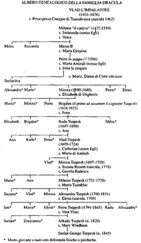As he finished speaking, a pebble grazed my shoulder. I flinched; Ser Cosimo saw it strike. And his eyes—
The look of the Devil, I was going to say, but perhaps it is better called the look of God. For the Devil can trick and test, but God alone metes out death, and only He can will a man to suffer for eternity.
That was that look I saw in Cosimo’s eye. He was capable, I decided, of undying spite, of murder without the slightest regret. Yet it was not that look that unsettled me. It was the fact that I recognized it and was still drawn to him; it was the fact that I knew it and did not want to look away.
He whirled on the crowd with that infinitely evil look. At once, the rain of stones ceased. When every man had grown silent, he called out, strong and clear:
“I am Cosimo Ruggieri, the astrologer’s son. Strike her again, if you dare.”
Nothing more was said. Darkly radiant, Ser Cosimo mounted his horse, and the guard pushed open the singing gate. The magician rode out, and the crowd parted for him.
The gate swung shut with a clang, and the guard slid the bolt into place. It was as though a signal had been given: The crowd came alive and again hurled pebbles and curses at the guards.
But the astrologer’s son passed unharmed, his head high, his shoulders square and sure. While the rest of the world fixed its unruly attention on the palazzo gates, he rode away, and soon disappeared from my sight.
My memories of Florence are blurred by terror, affection, distance, and time, but some impressions from that long-ago past remain sharp. The peals of church bells, for one: I woke and ate and prayed to the songs of the cathedral of San Lorenzo, which holds my ancestors’ bones; of Santa Maria del Fiore, with its vast impossible dome; of San Marco, where the mad monk Savonarola once dwelled. I can still hear the low “mooing” of the bell called the Cow, which hung in the great Palazzo della Signoria, seat of Florence’s government.
I remember, too, the rooms of my childhood, especially the family chapel. On the walls above the wooden choir stalls, my ancestors rode on grandly caparisoned horses in Gozzoli’s masterpiece, The Procession of the Magi. The mural spanned three walls. The eastern one captured my imagination, for it was the wall of the Magus Gaspar, he who led the way after Bethlehem’s star. My forefathers rode just behind him, in dazzling shades of crimson, blue, and gold.
The mural had been commissioned in Piero the Gouty’s time. He rode just behind Gaspar; my great-great-grandfather was a serious, tight-lipped man in his fifth decade, riding immediately in front of his own father, the aged but still wily Cosimo. His son Lorenzo il Magnifico followed them both. He was only eleven then, a homely boy with a jutting lower lip and wildly crooked nose. Yet there was something beautiful in his upward-slanting eyes, in their clear, focused intelligence that made me yearn to touch his cheek. But he had been painted high upon the wall, beyond my reach. Many times I had climbed onto a choir stall when the chapel was empty, but I could touch only the fresco’s lower edge. I had often been told that I possessed Lorenzo’s quick wit, and felt a kinship with him. His father had died when he was young, leaving him a city to rule; not long after, his adored brother was assassinated, leaving him truly alone.
But Lorenzo was wise. His child’s gaze was sober and steady. And it was fastened not on his father, Piero, or his grandfather Cosimo—but directly on golden-haired Gaspar, the Magus who followed the star.
Young Lorenzo gazed down at me that evening at vespers. Uncle Filippo was absent, but Clarice was there, her tense features softened beneath a gossamer black veil. She murmured prayers with one eye open, her monocular gaze darting behind her, at the open door. She had seemed chastened during her encounter with Ser Cosimo, but the intervening hours had restored her nerve.
To her immediate right was my cousin Ippolito, straight and tall, having recently sprouted a man’s broad chest and back. Tanned from hunting, he had grown a goatee and mustache, which enhanced his dark eyes and made him dizzyingly handsome. He was kind to me—we were after all, to be married someday and rule Florence together—but now he was eighteen and had come to notice women. And I was just a homely little girl.
Alessandro, his junior by two years, stood beside him, murmuring prayers with his eyes wide open. My half brother, Sandro, son of an African slave, had thick black brows, full lips, and a taciturn demeanor. No matter how long I studied his heavy, pouting features, I never glimpsed a hint of our common ancestry. Sandro was well aware that he lacked his elder cousin Ippolito’s physical beauty and charm. Their relationship had become marked by competitiveness, yet the two were inseparable, bound by their special status.
In the chapel, Ginevra prayed on Clarice’s immediate left, flanked by little Roberto, then Leone and Tommaso, then my beloved Piero. Even he, who had earlier been so dismissive of my fears, had grown quiet and pensive as the crowd outside our gates swelled.
I remember little of the actual ritual that evening—just Aunt Clarice’s strong alto as we sang the psalms, and the priest’s wavering tenor as he led the Kyrie eleison.
He had just begun to chant the benediction when Aunt Clarice’s head turned sharply. Outside, in the corridor, Uncle Filippo held his cap in his hands.
He was a grim man with sunken cheeks and grey hair cut short in the style of a Roman senator; when he caught Clarice’s eye, his expression grew even grimmer. She motioned quickly at Ginevra: Go, go. Take the children with you. She inclined her head at Ippolito and Alessandro. And take them, too.
The priest’s hand sliced horizontally through the air to complete the invisible cross. He, too, had seen the crowds at the gate and departed quickly through the exit near the altar.
Clarice moved aside, allowing Ginevra to herd the cousins toward the door. At the same time, Uncle Filippo advanced into the chapel. Last of the children, I lagged behind.
Sandro followed the others meekly, but Ippolito broke away from the group to face Clarice. “I will stay,” he said. “Filippo bears important news, doesn’t he?”
Clarice’s expression hardened, a sight that made Ginevra redouble her efforts to shoo the children outside. I ducked behind a choir stall, itching to hear Uncle Filippo’s news.
“Here now,” Filippo said gently as he came to stand beside his wife. “Ippolito, I need a moment alone with her.” He waited until Ginevra cleared the other boys out of the chapel. “You’ll hear everything in good time.”
Ippolito looked sharply from his aunt to his uncle. “Now is good time. I’ve been watching quietly while Passerini alienated the people. I can’t be patient any longer.” He drew in a breath. “You’ve been summoning military support, I take it. How do we stand?”
“We stand in a complicated situation,” Filippo said. “And I will tell you everything I have learned this evening. But first, I will have a private word with my wife.”
For a long moment, he and Ippolito stared at each other; Uncle Filippo was solid as stone. At last, Ippolito let go a sound of disgust, then turned away and strode out after the others.
Filippo drew Clarice to a pew. As he sat down beside her, she raised her veil and said, stricken: “So. We are lost then.”
Filippo nodded.
Flaring, Clarice jumped to her feet. “They’ve forsaken us already?” There was fury as well as disappointment in her tone. She had already known what news Filippo would bring, yet she had hoped wildly, secretly, that it would not be the news she expected.
Читать дальше












